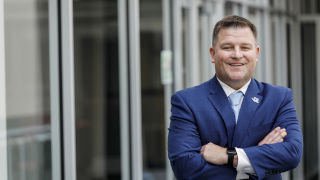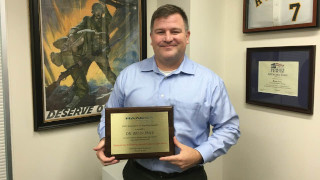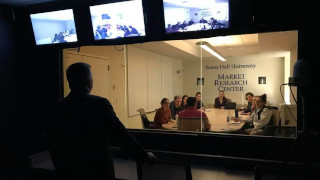Buccino Leadership Director Wins Innovation in Teaching Award
Thursday, October 21, 2021

Bryan Price, Ph.D., Executive Director of the Buccino Leadership Institute
Earlier this month the Middle Atlantic Association of Colleges of Business Administration (MAACBA) announced that Dr. Bryan Price, executive director of the Buccino Leadership Institute, won its annual Innovation in Teaching award. Price earned the award for the innovative methods used in the second year of the leadership program's four-year curriculum. MAACBA, an organization that's been in existence for 70 years, boasts over 160 universities and colleges along the east coast, including Ivy League schools and some of the top colleges in the nation.
It is the first time a faculty member from Seton Hall has won this prestigious award, which is the only award handed out during the annual MAACBA conference. For Dr. Karen Boroff, who was responsible for expanding the leadership program university-wide in 2018 as the Acting Provost, the award served as external validation for what she and other Seton Hall stakeholders already knew.

Dr. Price with the MAACBA Innovation in Teaching Award
"In every way, the Buccino Leadership Institute, from its inception, has been innovative. The Institute, like no other undergraduate leadership development program in the nation, has been at the forefront of how to develop our leaders of tomorrow, no matter the industry or profession. This accolade reaffirms the Institute's very highest quality and its fundamental DNA of developing leaders like no other program in its class."
The Buccino Leadership Institute, which now boasts 270 students in the four-year program, prides itself on experiential learning in an interdisciplinary environment and innovative blending of leadership development to include assessments, executive leadership coaching, and real-world projects. In the first year of programming, students learn how to lead themselves. They learn about their strengths and weaknesses, self-imposed limitations and how to overcome them, and values-based leadership. Freshmen take the Eq-i 2.0 assessment, the industry gold-standard for assessing emotional intelligence, and participate in a memorable trip to the National 9/11 Museum and Memorial.

Dr. Price observing an IDT session in the Market Research Center
Students are also split into teams of 10 to 11 students representing each school/college at the university and participate in interdisciplinary team (IDT) semester-long projects. In the second year, things get more intense. In the Fall semester, every sophomore takes the DISC behavior assessment, which examines an individual's observed behavior and helps leaders interpret the behavioral styles of others. After receiving a class on personal branding, every sophomore uploads an elevator pitch to articulate why an employer would want to hire them on their team.
At the end of the semester, each sophomore is given the opportunity to pitch an original idea for a semester-long IDT project in the Spring semester that will help either the university or the surrounding community. In a scene reminiscent of the television show Shark Tank, students present their idea in front of staff and faculty. The entire class votes on the top seven ideas, and the winners become what the CEO's. Over the winter break, each CEO is given access to three sources of information: the database of each student's DISC assessment; the database of each student's personal branding video; and each student's voting preference.
In the first class of the Spring semester, the CEOs meet with Dr. Price and the Institute's Associate Directors to conduct a live draft to hire their own interdisciplinary teams. Following the draft, CEOs discuss their methodology in their hiring process and break down the strategies they used to make hiring decisions. The Institute films both the draft and the first IDT meeting. For the latter, Price said they use the Stillman School of Business's Market Research Center. It's a state-of-the-art conference room outfitted with audio and video recording capabilities, and it adjoins a control room separated by double-paned glass where faculty and students can observe IDT meetings for development purposes.
The original intent of the Market Research Center was to record focus groups for students in Stillman's marketing program, but Price immediately had other ideas. "As soon as I saw that room and its capabilities, I saw its potential as a leadership development tool," Price said. "If up to 90% of communication is non-verbal, then why wouldn't leaders want to see how they look, sound, and behave in a real-world boardroom meeting?"
Students can see how they show up at a meeting and make a first impression. The IDT leader can review the video and assess how successful they were in running their first meeting. These sessions provide additional data from which faculty and students can critique leadership effectiveness and provide useful information on how to improve in the future.
"It's an amazing resource for leaders to have access to," Price continued, "and we're especially grateful that Professor [Adam] Warner allows us to use it." Price said that when he talks to corporate audiences, he asks CEOs if they've ever seen themselves on film during an in-person meeting. Although he's yet to find a CEO who has, Price says there's always a ton of heads nodding in agreement over the idea. Perhaps the most impactful part of the second-year experience in the Buccino Leadership Institute is the professional coaching each sophomore receives.
Every student receives 5.5 hours of coaching from hand-picked, ICF-certified leadership coaches. These coaches are normally coaching executives and other C-suite leaders in the tri-state area, but they believe so much in the Institute's mission and the value of coaching that they coach the Institute's leadership students at a reduced cost. Price said that he treats the Institute's leadership coaches like part of their family. It is not uncommon for coaches to attend IDT meetings and presentations, and they are kept abreast of all the Institute's leadership programming. This provides a unique opportunity for students to work with a leadership coach in the midst of a real-world project.
It should come as no surprise that students rank this coaching program as the most impactful leadership development activity in the four-year program. Price emphasized that this was a team award. "This award is nice validation that the Buccino Leadership Institute is a national leader in leadership development." "It takes a village to develop the next generation of leaders, and I owe everything to our students and associate directors who make it all happen. And without the support of our benefactor, Dr. Buccino '63, trailblazers like former Provost Karen Boroff, and our current university leaders like Provost Passerini and President Nyre, we couldn't deliver on our promise to develop leaders in this innovative way."
Categories: Arts and Culture, Campus Life, Education






